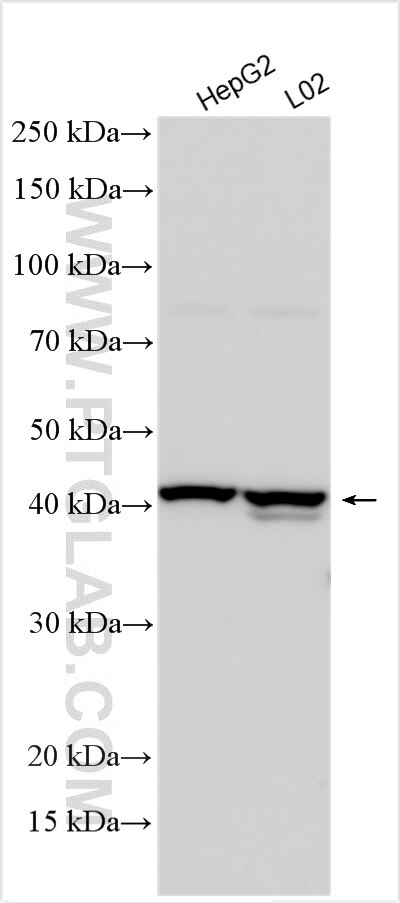Validation Data Gallery
Tested Applications
| Positive WB detected in | HepG2 cells, L02 cells |
Recommended dilution
| Application | Dilution |
|---|---|
| Western Blot (WB) | WB : 1:1000-1:6000 |
| It is recommended that this reagent should be titrated in each testing system to obtain optimal results. | |
| Sample-dependent, Check data in validation data gallery. | |
Product Information
29084-1-AP targets G6PC in WB, ELISA applications and shows reactivity with human samples.
| Tested Reactivity | human |
| Host / Isotype | Rabbit / IgG |
| Class | Polyclonal |
| Type | Antibody |
| Immunogen | G6PC fusion protein Ag30614 相同性解析による交差性が予測される生物種 |
| Full Name | glucose-6-phosphatase, catalytic subunit |
| Calculated molecular weight | 357 aa, 40 kDa |
| Observed molecular weight | 40 kDa |
| GenBank accession number | BC130478 |
| Gene Symbol | G6PC |
| Gene ID (NCBI) | 2538 |
| RRID | AB_3669673 |
| Conjugate | Unconjugated |
| Form | Liquid |
| Purification Method | Antigen affinity purification |
| UNIPROT ID | P35575 |
| Storage Buffer | PBS with 0.02% sodium azide and 50% glycerol , pH 7.3 |
| Storage Conditions | Store at -20°C. Stable for one year after shipment. Aliquoting is unnecessary for -20oC storage. |
Background Information
Glucose-6-phosphatase-α (G6PC) is a key enzyme in glucose homeostasis that catalyzes the hydrolysis of glucose-6-phosphate to glucose and phosphate in the terminal step of gluconeogenesis and glycogenolysis. G6PC activity is restricted to the liver , the kidney cortex and the small intestine and confers on these three organs the capacity to release glucose into the systemic circulation (PMID: 21983240).The encoded enzyme is anchored to the ER by nine transmembrane helices with the amino (N)-terminus in the lumen and the carboxyl (C)-terminus in the cytoplasm (PMID: 15542400).
Protocols
| Product Specific Protocols | |
|---|---|
| WB protocol for G6PC antibody 29084-1-AP | Download protocol |
| Standard Protocols | |
|---|---|
| Click here to view our Standard Protocols |
